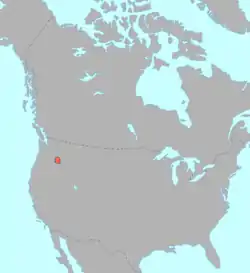Cayuse language
The Cayuse language (Cailloux, Willetpoos) is an extinct unclassified language formerly spoken by the Cayuse Native American tribe in the U.S. state of Oregon. The Cayuse name for themselves was Liksiyu (see Aoki 1998).
| Cayuse | |
|---|---|
 | |
| Native to | United States |
| Region | Oregon |
| Ethnicity | Cayuse |
| Extinct | 1930s[1] |
Unclassified | |
| Language codes | |
| ISO 639-3 | xcy |
xcy | |
| Glottolog | cayu1241 |
Classification
Similarities to Molala, the language of people to the south of them in central Oregon, are thought to have been due to contact (Rigsby 1969: 71).[2]:71
Edward Sapir had originally grouped Cayuse with Molala as part of a Waiilatpuan branch with the Plateau Penutian languages; the Waiilatpuan group had been originally proposed by Horatio Hale (1846), based on his 1841 field work with the Cayuse people at Waiilatpu Mission. However, Cayuse has little documentation, and that which is documented is inadequately recorded.
Pronouns
Cayuse pronouns listed by Horatio Hale (1846):[2]
I iniŋ you (sg.) nikí you (du.) nkímiš he nip we námək you (pl.) mkímiš they nípik
Cayuse pronouns listed by McBean:[2]
I in ning you (sg., pl.) in kai he neepe we nung naw naw they cap pick
Verbs
Cayuse verb paradigms documented by Henry W. Henshaw:[2]
- 'hungry'
I am hungry. wi-tu-tŭnt I was hungry. kler-ka-wĭ-tu-tŭnt I will be hungry. wí-tu-näk-sŭnt You and I are hungry. swi-tu-ter-yìk You and I were hungry. swi-tu-te-lì-kai-ĭk You and I will be hungry. nĭng-i-li-pʔl-swi-tu-nak-stunk-a-wak You are hungry. tu-swi-tu-tuñg-a You were hungry. swi-tu-til-kutla You will be hungry. swi-tu-nak-stung-at-la
- 'thirsty'
I am thirsty. nĭs-ka-mu-tiñg I was thirsty. nĭs-ka-mu-til I will be thirsty. nĭs-ka-mu-näk-skĭn You are thirsty. tu-mĭs-ka-mu-tĭñg You were thirsty. mĭs-ka-mu-til-hă You will be thirsty. mĭs-ka-mu-na-stĭnk-la
Vocabulary
In 1910 or 1911, Stephens Savage, a Molala speaker, had told Leo Frachtenberg that the following five words were identical in both Cayuse and Molala (considered by Rigsby (1969) to be loanwords).[2]
sorrel horse qasqasi tasiwitkwi spotted horse yuꞏk tasiwitkwi black horse múkimuki tasiwitkwi comb taꞏsps spoon ƚúꞏpinc
Limited lexical items in Cayuse had also been collected by Bruce Rigsby, Melville Jacobs, Verne Ray, and Theodore Stern. Their Cayuse informants had highly limited knowledge of Cayuse and were more fluent in Sahaptin or Nez Perce.
Hale (1846)
A word list of Cayuse with nearby 200 lexical items was documented by Horatio Hale (1846: 570-629). The word list has been reproduced below.[3]
Nouns
gloss Cayuse man yúant woman pintχlkaíu; watχlóa boy láutlaŋ girl staítχləŋ; staítlaŋ infant; child skútχla father pintét; títʃa mother penín; nínʃa husband ináiu wife inχlkaío son wái daughter wái brother pnákən; pənátaŋ sister pənátiaŋ; pənwaíəq Indian; people - head talʃ; táəlʃ hair tχlókomot face léequkʃ forehead penátχliʃ ear takʃ eye hăkaməʃ nose pitχlóken mouth səmqakʃ tongue puʃ teeth tenif beard ʃimkéməʃ neck yet arm tiélaq hand épip fingers épip nails ʃíŋiʃ body ʃilăməʃ leg maúwət foot tiʃ toes tiyəyáu bone pápət heart - blood tiwéə̈ʃ town; village - chief iatóiaŋ warrior lotéwa friend enlápoit house niʃt kettle tχlípaniʃ bow hífoit arrow lalχ axe; hatchet yeŋgókinʃ knife ʃekt canoe; boat tχláap shoes täítχlo pipe iptnχlónʃ tobacco hanʃ sky; heaven ndjălawaía, tíŋpap sun huéwiʃ moon hátχltóp star tχlítχliʃ day ewéiə̈ night ftalp light notawásim darkness ʃilímtiŋk morning tétχlpəna evening wəχaía spring ʃuatoluŋátntiŋ; kiátim summer ʃqáätim autumn təŋ winter wit wind húntilχp thunder tiŋtululutéʃin lightning ʃniktawíŋtiŋ rain tiʃtkitχlmítiŋ snow pói hail puŋiós fire tetʃ water iʃkáiniʃ ice tók earth; land liŋʃ sea yamué-iʃkaíniʃ river luʃmi lake fuŋʃ valley paniákp hill; mountain téit island liŋtkaíli stone ápit salt kamtiʃímpen iron qauqauítχliínik tree laúik wood hútiʃ leaf qaisós bark pétimi grass tχleft; qə́ïʃt pine laúikʃ flesh; meat pítχli dog náapaŋ buffalo - bear liméakʃ; nokoláo wolf tχlaíu; tsóilaχs deer aitχléwa elk yútiŋʃ beaver pīeká tortoise atsík fly tqaínʃiʃ; katχlísaŋ mosquito píŋkii snake waíimaʃ bird tianíyiwa egg lópitχl feathers tiaqaímutχl wings haŋ duck əʃimtχl pigeon súuku fish wiaíiʃ salmon milóqli sturgeon - name peʃp affection atíŋp; tiʃktaʃewetáuŋko
Adjectives
gloss Cayuse white tχlaktχláko black ʃkupʃkúpu red lakaítlakaítu blue yotsyóts yellow qəʃqə́ʃu green yotsyóts great yaúmua; yiyímu (pl.) small etsáŋua strong ntáloa; naantáloa old kuiátsu young itsáŋu good suaíu; sasuáiu (pl.) bad luastu; laluástu (pl.) handsome hapútsu; suaíu ugly huástu alive wióko dead úwaa cold ʃúŋa warm lokóia
Pronouns
gloss Cayuse I íniŋ thou nikí he nip we námək ye mkímiʃ; nkímiʃ (dual) they nípik this qe, qă, ke that qá, ká all naŋináo many (much) yíphea who iʃ
Adverbs and others
gloss Cayuse near piáfi today páməŋ yesterday iétin tomorrow tetχlp yes i no téehu
Numerals
gloss Cayuse one na two lépli three mátnin four pípiŋ five táwit six nōiná seven nóilip eight nōimát nine tanáuiaiʃímʃim ten niŋítelp eleven nántetχle twelve leplin-ntétχle twenty lépuik thirty mátuík one hundred niŋítalpuík one thousand -
Verbs
gloss Cayuse to eat pitáŋa to drink pasqunstáŋa to run pqíntuql to dance iókseak to sing tuŋséaql to sleep ʃpíʃiŋql to speak úlipkin to see miskaléntənt to love ktáʃo to kill piaíitχltiŋ to sit ifníql; ifníkta to stand laútsiŋ to go wintúkstaŋa; wintúql (imp.) to come wintúkum
References
- Cayuse at MultiTree on the Linguist List
- Rigsby, Bruce. 1969. The Waiilatpuan Problem: More on Cayuse-Molala Relatability. Northwest Anthropological Research Notes 3. 68-146.
- Hale, Horatio (1846). Ethnography and Philology. Philadelphia: C. Sherman.
 This article incorporates text from this source, which is in the public domain.
This article incorporates text from this source, which is in the public domain.
- Aoki, Haruo. (1998). A Cayuse Dictionary based on the 1829 records of Samuel Black, the 1888 records of Henry W. Henshaw and others, Manuscript. The Confederated Tribes of the Umatilla Indian Reservation.
- Rigsby, Bruce. (1965). Linguistic Relations in the Southern Plateau, PhD dissertation, University of Oregon.
External links
| Wiktionary has a word list at Appendix:Cayuse word list |